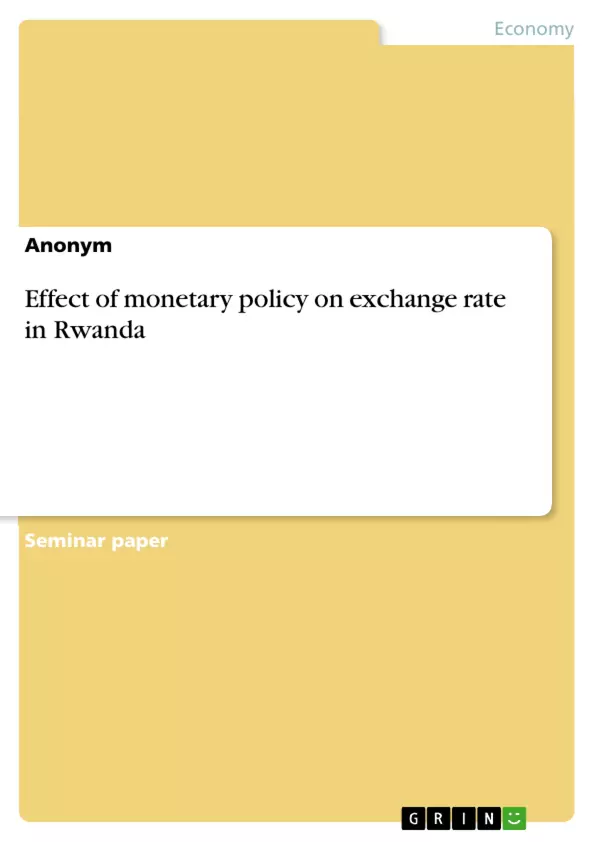The purpose of this study was to assess the effect of monetary policy on exchange rate in Rwanda. In conducting this research, four objectives were to assess the effect of monetary stock on exchange rate in Rwanda, to assess the effect of interest rate on exchange rate in Rwanda, to analyze the effect of oil prices on exchange rate in Rwanda and finally to examine the effect of government expenditure on exchange rate in Rwanda. To achieve these objectives, literature was reviewed on the subject matter including definitions of key concepts, conceptual review, theoretical framework, conceptual framework and research gap analysis; additionally this study used quantitative research design through the interpretation of findings about the effect of monetary policy on exchange rate in Rwanda during the period of 2000 up to 2022. Also, thus study considered only using secondary data.
Monetary policy has a strong influence over interest rates in the economy, including the lending and deposit rates faced by households and businesses.
Inhaltsverzeichnis (Table of Contents)
- ABSTRACT
- 1.1 Statement of the problem
- 1.2. Objectives of the study.
- 1.2.1. General objective
- 1.2.2. Specific objectives
- 1.3 Significance of the Study.
- 2.1. Theoretical review
- 2.1.1. Fischer's Effect Theory.
- 2.1.2. Unit pricing theory.
- 2.1.3. Classical theory of interest.
- 2.2. Conceptual framework
- 3.1. Research design
- 3.2. Data collection methods.
- 3.2.1. Sources of data
- 3.2.2. Secondary data
- 3.3. Data processing techniques..
- 3.3.1. Model specification......
- 3.3.2. Descriptive statistics
- 3.3.3. Unit Root......
- 3.3.4. Co-integration
- 3.3.5. Post estimation Test
- 3.3.6. Heteroskedasticity
- 3.3.7. Autocorrelation....
- 4.1 Data analysis and results interpretation.....
- 4.1.1 Descriptive statistics
- 4.1.2 Unit root tests
- 4.1.3. Regression results
- 4.1.4. Error autocorrelation (LM).
- 5.1. Conclusion.
- 5.2. Recommendations
- REFERENCES.
Zielsetzung und Themenschwerpunkte (Objectives and Key Themes)
This study aims to evaluate the impact of monetary policy on exchange rates in Rwanda from 2000 to 2022. The research investigates the influence of various monetary policy instruments on exchange rate fluctuations. The analysis is primarily focused on the role of monetary stock, interest rates, oil prices, and government expenditure.
- The effect of monetary policy instruments on exchange rate dynamics in Rwanda.
- The relationship between monetary stock and exchange rate.
- The impact of interest rate changes on exchange rate fluctuations.
- The role of oil prices in influencing exchange rates.
- The connection between government expenditure and exchange rate variations.
Zusammenfassung der Kapitel (Chapter Summaries)
- Abstract: Provides an overview of the study's objectives and methodology, outlining the focus on assessing the effect of monetary policy on exchange rates in Rwanda. The study utilizes quantitative research methods and secondary data from 2000 to 2022.
- 1.1 Statement of the problem: Introduces the context of monetary policy and its importance for managing economic fluctuations and achieving price stability. It emphasizes the challenges faced by Rwanda in managing inflation and exchange rates, highlighting the role of international commodity prices and credit risk in the banking sector.
- 1.2. Objectives of the study: Defines the general objective of assessing the effect of monetary policy on exchange rates and outlines specific objectives focusing on the impact of monetary stock, interest rates, oil prices, and government expenditure.
- 1.3 Significance of the Study: Explains the importance of the research for various stakeholders, including researchers, the National Central Bank (BNR), and future researchers.
- 2.1. Theoretical review: Discusses existing theories related to the influence of monetary policy on exchange rates, including the International Fisher Effect (IFE), unit pricing theory, and the classical theory of interest. It explores the relationships between these theories and their relevance to the study's context.
- 2.2. Conceptual framework: Presents a theoretical framework for understanding the relationship between monetary policy and exchange rates, outlining key variables and their hypothesized influence on exchange rate dynamics.
- 3.1. Research design: Describes the methodological approach used for the research, including the quantitative research design, data sources, and data collection methods. It outlines the time period under consideration (2000 to 2022) and the focus on secondary data.
- 3.2. Data collection methods: Explains the sources of data used in the research, emphasizing the reliance on secondary data sources. It details the specific data sources and the nature of the collected data.
- 3.3. Data processing techniques: Outlines the data processing techniques employed in the study, including model specification, descriptive statistics, unit root tests, co-integration analysis, post-estimation tests, heteroskedasticity analysis, and autocorrelation analysis.
- 4.1 Data analysis and results interpretation: Presents the results of the data analysis, encompassing descriptive statistics, unit root tests, regression results, and tests for error autocorrelation. It highlights key findings related to the relationship between monetary policy instruments and exchange rates in Rwanda.
Schlüsselwörter (Keywords)
The core concepts and topics of this study revolve around the relationship between monetary policy and exchange rates. The analysis centers on key economic variables, including monetary stock, interest rates, oil prices, and government expenditure, to assess their influence on exchange rate fluctuations in Rwanda. The research employs quantitative methods and analyzes secondary data to understand the impact of monetary policy on exchange rate dynamics in a developing country context.
- Arbeit zitieren
- Anonym (Autor:in), 2024, Effect of monetary policy on exchange rate in Rwanda, München, GRIN Verlag, https://www.grin.com/document/1452733



